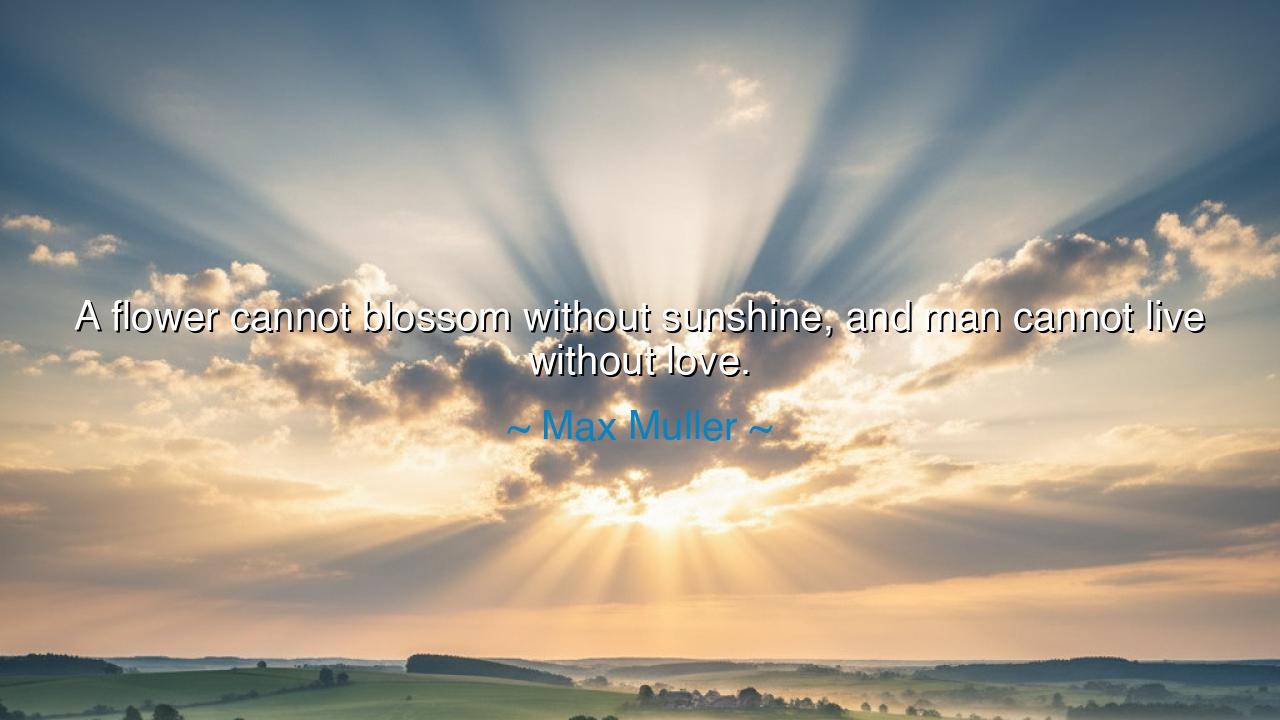
A flower cannot blossom without sunshine, and man cannot live






"A flower cannot blossom without sunshine, and man cannot live without love." – Max Müller
From the gentle wisdom of Max Müller, scholar of ancient tongues and seeker of divine truth, comes a saying that blooms with eternal meaning. “A flower cannot blossom without sunshine, and man cannot live without love.” In these few words, Müller captures the very essence of life — that as the flower turns toward the sun for light and warmth, so too does the human soul turn toward love for meaning and survival. Without light, the flower withers; without love, the spirit fades. For just as sunlight nourishes the earth, love nourishes the soul, awakening growth, courage, and joy.
Müller, a man who studied the sacred writings of East and West, saw in every faith the same truth: that love is the unifying power of the universe. He believed that love is not merely an emotion, but the divine breath that sustains all life — the bond that connects human beings to one another and to the eternal. In his time, he sought to bridge nations through understanding and compassion, and so his words remind us that love, like sunlight, belongs to all. It shines without prejudice, warming saint and sinner alike, and in its light, every soul may bloom.
The flower in Müller’s metaphor is the human heart — delicate yet resilient, beautiful yet vulnerable. Without care, it closes upon itself, but with warmth, it opens toward life. The sunshine is love in all its forms: the tenderness of family, the loyalty of friendship, the compassion of strangers, and the divine mercy that transcends all. Love is not a luxury; it is the light by which we grow into who we are meant to be. A man may eat and breathe, yet if he is starved of love, he merely exists; only through love does he truly live.
History itself bears witness to this truth. Consider the story of Nelson Mandela, who endured decades of imprisonment in the darkness of hatred. Many would have emerged hardened or broken, but Mandela allowed the light of love — for his people, for justice, even for his enemies — to shine within him. That love sustained him when all else was taken away. When he walked free, he did not seek vengeance, but reconciliation. Like the flower blooming after long night, his heart turned toward the sun, and through his love, an entire nation began to heal.
Love, then, is not weakness, but power — not softness, but strength. The sun does not ask permission to shine; it gives freely, and in that giving, it sustains the world. So too must our love be given — not conditionally, not sparingly, but boldly. The ancients taught that to love is to participate in the divine. It is to take part in the great cycle of creation, where giving and receiving become one. To withhold love is to deny life itself; to give love is to become radiant, as the sun that never ceases to rise.
Yet Müller’s wisdom also carries a quiet warning: a flower cannot live in darkness, and neither can a human soul thrive in isolation. Those who close themselves off in fear or pride, who refuse to give or receive love, become like blossoms trapped in shadow — existing, but never blooming. To love requires risk, yes — the risk of pain, of loss, of vulnerability — but it is the only path to true life. For every petal that opens risks the wind, yet without opening, it would never know the sun.
So, my children of the heart, remember this teaching: you were made for love as surely as the flower was made for light. Do not seek to live without it, for without love, even triumph tastes hollow, and even abundance feels empty. Give love generously — to your family, to your friends, to the stranger who passes you on the road. And do not forget to love yourself, for you too are a flower in need of the sun’s warmth.
For in the end, as Max Müller reminds us, “A flower cannot blossom without sunshine, and man cannot live without love.” Let your life be a garden of kindness, your heart a sun that warms others. Love deeply, love bravely, love endlessly — and you will find that in giving love, you yourself are bathed in its light. Then, like the flower lifted toward dawn, your soul will bloom — radiant, alive, and eternal beneath the sun of divine love.






AAdministratorAdministrator
Welcome, honored guests. Please leave a comment, we will respond soon